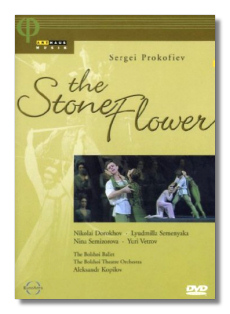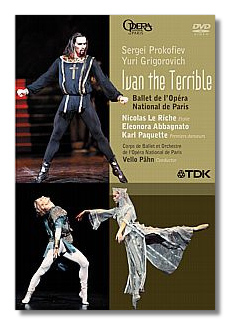
The Internet's Premier Classical Music Source
Related Links
- Prokofieff Reviews
- Latest Reviews
- More Reviews
-
By Composer
-
Collections
DVD & Blu-ray
Books
Concert Reviews
Articles/Interviews
Software
Audio
Search Amazon
Recommended Links
Site News
 DVD Review
DVD Review
Serge Prokofieff

The Stone Flower
- Nicolai Dorokhov – Danilo
- Lyudmilla Semenyaka – Katerina
- Nina Semizorova – Mistress of Copper Mountain
- Yuri Vetrov – Severyan
The Bolshoi Ballet
The Bolshoi Theatre Orchestra/Alexandr Kopilov
Choreography by Yuri Grigorovich
Arthaus Musik DVD 101121 112m Full Frame LPCM Stereo


Ivan the Terrible
- Ivan - Nicolas Le Riche
- Anastasia - Eleonora Abbagnato
- Prince Kurbsky - Karl Paquette
Le Corps de Ballet et l'Orchestre de l'Opera National de Paris/Vello Pähn
Yuri Grigorovich – Choreography and Stage Director
TDK DVD BLITT LPCM stereo, Dolby Digital 5.0, DTS 5.0 Widescreen 16:9
Prokofiev's The Stone Flower has the reputation of being the least compelling of his three Soviet-era ballets. But that's not as bad an assessment as it sounds, since few ballets by anyone stand well alongside Roméo and Juliet and Cinderella, two of the composer's greatest masterpieces for the stage. True, The Stone Flower is mild in its expressive language, having a low quotient of dissonance and a high measure of easily-comprehensible tunes. But I'm not sure that melody and accessibility are such sins any more, but if they are Prokofieff is plenty guilty here, but then I guess we'll have to point an accusatory finger at Tchaikovsky, too, for his ballets.
Even if one views The Stone Flower as watered-down Prokofieff – which it isn't, in my opinion – it is a nearly irresistible offer here. For one thing, compared with the flawed versions of Roméo and Juliet that I've encountered on DVD – one a Bolshoi effort on Arthaus, the other a Teatro alla Scala production on TDK – it is quite effective, ultimately more satisfying than either of those two. This 1990 live Bolshoi presentation of The Stone Flower is visually quite appealing, both in its splendid dancing and imaginative sets, the latter, despite their often barren appearance, brilliantly atmospheric and colorful. Moreover, the orchestral playing is spirited, if not flawless, and Alexandr Kopilov's reading is consistently insightful.
But the recording does have at least one significant drawback: like the Bolshoi and Scala Romeos, this Stone Flower is cut. (Why is it that so many full-length ballets, even acknowledged masterpieces like Roméo and Juliet, are routinely cut?) Normally The Stone Flower should run about two-and-a-quarter hours, but this performance clocks in at about 100 minutes, though the timing on the back cover is listed at 120 minutes, and promotional information on the internet gives 112 minutes as the duration. These lengthier timings apparently include the tracks for the opening and closing credits and perhaps for other insignificant portions. In any event, it is not the complete ballet – not that Arthaus insists it is. All forty-six numbers, however, are included, though some are shortened: for example, #7, Maiden's Dance, which usually runs about four minutes, clocks in here at 2:03; #12 and 13, Severyan's Arrival and Altercation over the Malachite Vase, respectively, are played together with a timing of 3:01, whereas eight minutes or so would be necessary to accommodate complete performance of both.
Despite my harping on the issue of cuts, the production does justice to Prokofieff's music and his ballet. For one thing, as mentioned above, the dancing is brilliant: I especially liked Nina Semizorova as the Mistress of Copper Mountain and Yuri Vetrov as Severyan. The sound reproduction is quite good, too, in spite of some odd balances: certain brass instruments are pushed back too far, while the clarinet and other less voluminous instruments are well up front. Still, this is not a major drawback. Neither is the audience who interrupts with applause at the end of certain numbers and also occasionally makes background noise. A few numbers from earlier in the ballet are shifted to the last act, but their insertion is seamless and works just fine.
At the moment, the only other serious competition to this release is not a DVD but a CD of the complete work on Chandos, with Gianandrea Noseda conducting the BBC Philharmonic Orchestra. It's a good if leisurely-paced performance, with slightly less spirited playing. In the end, I must give this Arthaus issue a very positive verdict – not only will most balletomanes and Prokofieff mavens find this a treat, but those with conservative, pre-20th-century tastes should quickly warm up to the music and performances.
As for Ivan the Terrible DVD here, it is the second recording of this ballet to be released in the last six months or so. To give you an idea of what it is – since Prokofieff never actually wrote a ballet entitled Ivan the Terrible – let me quote from my review of the first Ivan release (Arthaus Musik; recorded live at the Bolshoi in 1990) from a few months ago here at Classical Net:
"… what we have here is an adaptation – often, a very free adaptation – of Prokofieff's film score to Sergei Eisenstein's two-part film about Ivan the Terrible. (A third part was planned but never made.) The adaptation was made by Mikhail Chulaki, who also drew heavily on music from Prokofieff's Third Symphony, Russian Overture and Alexander Nevsky. Whenever the ballet score closely follows Prokofieff's originals, the orchestration is almost invariably different in some way. Thus, in the end, we get an episodic arrangement of themes and sections from Prokofieff's music.
In other words, like Chopin's Les Sylphides, it is a compilation of the composer's music from several different works arranged, rearranged, re-orchestrated, and jig-sawed together to fit a ballet scenario about 16th century Tsar Ivan IV of Russia, the so-called 'Ivan the Terrible'. This TDK release is a recording of a live performance at the Paris National Opera, from December, 2003. Actually, I'm sure it's an account of several performances from that period seamlessly edited together by TDK. The question for those interested in purchasing this colorful, ersatz-Prokofieff ballet is, which of the two recent recordings is the preferred choice?
The timings for both releases are given on their back covers, and they are, by no spectacular coincidence, identical – 114 minutes! The choreographer for both productions was Yuri Grigorovich, and one of the principal dancers on the Arthaus release, the great Natalia Bessmertnova (Anastasia), is listed as an assistant choreographer for the TDK DVD. Sets and costumes for both Ivans were designed by the same fellow, Simon Virsaladzé. Both recordings feature fine dancing and spirited orchestral performances. The Russians may have a bit more energy in the latter category, but the French play, it seems, with a tad more subtlety, and are given better sound reproduction by the TDK engineers. The Russian players are more closely miked and come across with a few instrumental imbalances, although their sonics are more than acceptable. In the end, the buyer won't be disappointed by either of these DVDs, but the more colorful sets and better sound make the TDK a slightly better choice.
Copyright © 2005, Robert Cummings




















